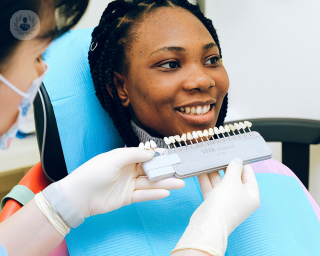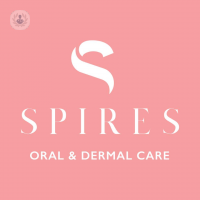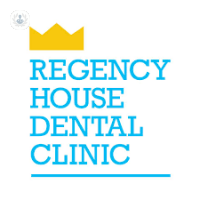What is teeth whitening?
Teeth whitening refers to the process of bleaching teeth in order to make them lighter. This does not necessarily mean that results will be brilliant white in colour, but rather that teeth will be lightened considerably, by several shades.
While there are over-the-counter (OTC) treatments, and certain salons may offer the procedure, there are risks involved and the procedure should be performed by a dental professional. It can make a particular difference to those with yellow tones in their teeth, but not everyone is suited to teeth whitening (e.g. those with gum disease), and it doesn’t work on dentures, veneers, crowns, or fillings.

Who performs the teeth whitening procedure?
Teeth whitening is usually considered a cosmetic treatment and is done privately in most cases. Treatments and prices of teeth whitening treatment can vary. It is usually advisable to discuss a treatment plan and price estimate with the professional before committing to the procedure. Whitening is safe when carried out by a registered dental professional. In the UK only dentists or dental professionals (e.g. hygienists) can carry out teeth whitening. It is very rarely performed on the NHS, and only in cases where it is a medical treatment only, such as nerve death.
Can teeth whitening be done at home?
Teeth whitening can also be done using home kits, but the percentage of hydrogen peroxide, the chemical used to whiten the teeth, does not come in such high doses in over-the-counter teeth whitening kits. Legally these kits cannot contain the same amount of hydrogen peroxide as treatments offered by dental professionals. Often OTC treatments do not contain enough for the treatment to be effective.
How long do teeth whitening effects last?
The effects of teeth whitening are not permanent and can last from a number of months to around three years. Smoking, drinking coffee, tea, or red wine can reduce the whitening effect or cause your teeth to stain again.
11-13-2012 03-16-2023Teeth whitening
What is teeth whitening?
Teeth whitening refers to the process of bleaching teeth in order to make them lighter. This does not necessarily mean that results will be brilliant white in colour, but rather that teeth will be lightened considerably, by several shades.
While there are over-the-counter (OTC) treatments, and certain salons may offer the procedure, there are risks involved and the procedure should be performed by a dental professional. It can make a particular difference to those with yellow tones in their teeth, but not everyone is suited to teeth whitening (e.g. those with gum disease), and it doesn’t work on dentures, veneers, crowns, or fillings.

Who performs the teeth whitening procedure?
Teeth whitening is usually considered a cosmetic treatment and is done privately in most cases. Treatments and prices of teeth whitening treatment can vary. It is usually advisable to discuss a treatment plan and price estimate with the professional before committing to the procedure. Whitening is safe when carried out by a registered dental professional. In the UK only dentists or dental professionals (e.g. hygienists) can carry out teeth whitening. It is very rarely performed on the NHS, and only in cases where it is a medical treatment only, such as nerve death.
Can teeth whitening be done at home?
Teeth whitening can also be done using home kits, but the percentage of hydrogen peroxide, the chemical used to whiten the teeth, does not come in such high doses in over-the-counter teeth whitening kits. Legally these kits cannot contain the same amount of hydrogen peroxide as treatments offered by dental professionals. Often OTC treatments do not contain enough for the treatment to be effective.
How long do teeth whitening effects last?
The effects of teeth whitening are not permanent and can last from a number of months to around three years. Smoking, drinking coffee, tea, or red wine can reduce the whitening effect or cause your teeth to stain again.


Teeth whitening and its benefits
By Dr Qasim Mughal
2024-12-25
Teeth whitening is a highly effective cosmetic dental procedure that can enhance the appearance of your smile, boost your confidence and provide long-lasting results. Leading dentist Dr Qasim Mughal goes into expert detail about its benefits, and more, in this comprehensive article. See more


Cosmetic dentistry and veneers: Everything you need to know
By Dr Vanya Ruseva
2024-12-25
Veneers are a versatile and effective option for improving the appearance of your smile through cosmetic dentistry. Leading principal dentist Dr Vanya Ruseva answers commonly-asked questions about them, in this informative article. See more


The Bioclear Method: is it right for you?
By Dr Olurotimi Adesanya MBE
2024-12-23
Over the years, our teeth are exposed to wear and tear and discolouration, and while there are many treatments around that can help you improve your smile, Bioclear is one of the few that will give you long-lasting results without damaging or removing your natural teeth. Dr Olurotimi Adesanya, a leading dentist based in Kent, explains all the advantages and disadvantages of Bioclear and whether this treatment is a good fit for you. See more


Tooth whitening - what actually works?
By Dr David Bloom
2024-12-23
Professional tooth whitening is often touted as the only treatment with long-lasting effects – but what is it, what does it involve, and who can carry it out? We asked top restorative and cosmetic dentist Dr David Bloom, who practises at a number of clinics in central London. See more
Experts in Teeth whitening
-
Dr Mark Hughes
DentistryExpert in:
- Cosmetic dentistry (aesthetic dentistry)
- Veneers
- Teeth whitening
- Dental crown
- Invisalign
- Smile design
-
Dr Adam Thorne
DentistryExpert in:
- Cosmetic dentistry (aesthetic dentistry)
- Smile design
- Veneers
- Invisalign
- Teeth whitening
- Dental crown
-
Dr Biju Krishnan
DentistryExpert in:
- Cosmetic dentistry (aesthetic dentistry)
- Composite bonding
- Teeth whitening
- Paediatric orthodontics
- Aesthetic orthodontics
- Orthodontics
-
Dr Chaw-Su Kyi
OrthodonticsExpert in:
- Invisalign
- Lingual braces
- Damon braces
- Orthodontics
- Teeth whitening
- Paediatric orthodontics
-
Dr Peter McQuillan
DentistryExpert in:
- Cosmetic dentistry (aesthetic dentistry)
- Invisalign
- Veneers
- Facial aesthetics
- Composite veneers
- Teeth whitening
- See all

Spires Oral & Dermal Care
Spires Oral & Dermal Care
11 Kirk Avenue, Magherafelt, BT45 6BT
No existe teléfono en el centro.
By using the telephone number provided by TOP DOCTORS, you automatically agree to let us use your phone number for statistical and commercial purposes. For further information, read our Privacy Policy
Top Doctors

William Place Dental Aesthetics
William Place Dental Aesthetics
12 William Pl, Bow, London
No existe teléfono en el centro.
By using the telephone number provided by TOP DOCTORS, you automatically agree to let us use your phone number for statistical and commercial purposes. For further information, read our Privacy Policy
Top Doctors

Regency House Dental Clinic
Regency House Dental Clinic
28 St Peter's St, St Albans AL1 3NA
No existe teléfono en el centro.
By using the telephone number provided by TOP DOCTORS, you automatically agree to let us use your phone number for statistical and commercial purposes. For further information, read our Privacy Policy
Top Doctors
-
Spires Oral & Dermal Care
11 Kirk Avenue, Magherafelt, BT45 6BT, MagherafeltExpert in:
- Root canal
- Tooth decay
- Tooth wear
- Aesthetic Dentistry
- Facial aesthetics
- Dentistry
-
William Place Dental Aesthetics
12 William Pl, Bow, London, East LondonExpert in:
- Sleep apnoea
- Root canal
- Tooth decay
- Tooth wear
- Aesthetic Dentistry
- Dentistry
-
Regency House Dental Clinic
28 St Peter's St, St Albans AL1 3NA, St AlbansExpert in:
- Braces
- Crowns
- Cosmetic dentistry
- Dental implants
- Dental check up (adults)
- Dental check up (children)
- Most viewed diseases, medical tests, and treatments
- Snoring
- Chronic headache
- Visual impairment
- Diabetic retinopathy
- Retina
- Visual stress (Meares-Irlen syndrome)
- Presbyopia
- Nystagmus
- Myopia
- Hyperopia (farsightedness)








